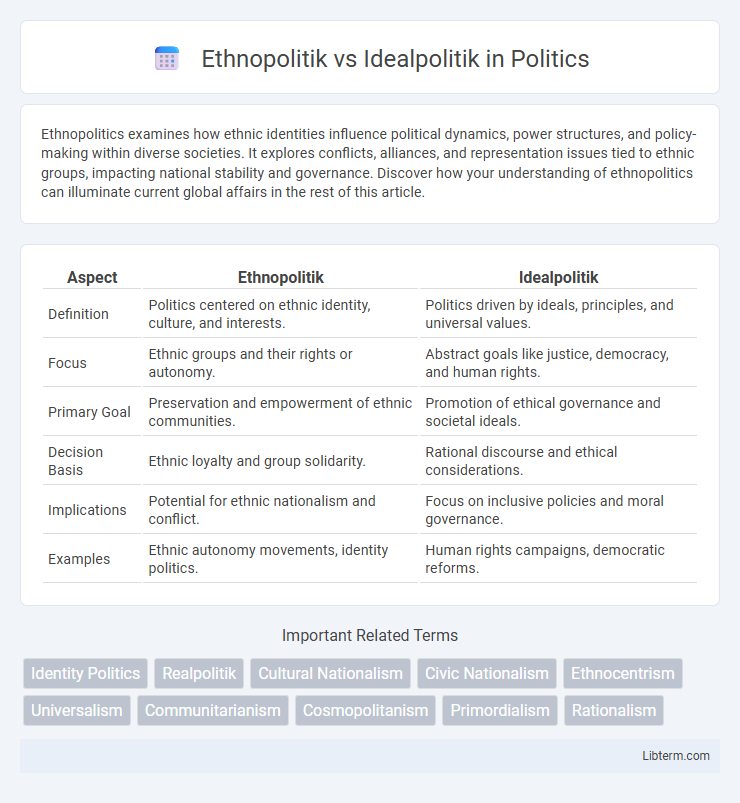Ethnopolitics examines how ethnic identities influence political dynamics, power structures, and policy-making within diverse societies. It explores conflicts, alliances, and representation issues tied to ethnic groups, impacting national stability and governance. Discover how your understanding of ethnopolitics can illuminate current global affairs in the rest of this article.
Table of Comparison
| Aspect | Ethnopolitik | Idealpolitik |
|---|---|---|
| Definition | Politics centered on ethnic identity, culture, and interests. | Politics driven by ideals, principles, and universal values. |
| Focus | Ethnic groups and their rights or autonomy. | Abstract goals like justice, democracy, and human rights. |
| Primary Goal | Preservation and empowerment of ethnic communities. | Promotion of ethical governance and societal ideals. |
| Decision Basis | Ethnic loyalty and group solidarity. | Rational discourse and ethical considerations. |
| Implications | Potential for ethnic nationalism and conflict. | Focus on inclusive policies and moral governance. |
| Examples | Ethnic autonomy movements, identity politics. | Human rights campaigns, democratic reforms. |
Introduction to Ethnopolitik and Idealpolitik
Ethnopolitik centers on political strategies grounded in ethnic identity, emphasizing group loyalty, cultural preservation, and the mobilization of ethnic communities to achieve political goals. Idealpolitik, by contrast, prioritizes principles and ideological goals over ethnic considerations, often advocating universal values such as democracy, justice, and human rights as the basis for political interaction and policy-making. Understanding the foundational differences between Ethnopolitik and Idealpolitik is essential for analyzing conflicts and governance models in multi-ethnic societies.
Historical Roots and Evolution of Both Concepts
Ethnopolitik, rooted in 19th-century nationalist movements, emphasizes the role of ethnicity and cultural identity in shaping political boundaries and statehood, often linked to the preservation of ethnic groups and their historical territories. Idealpolitik, evolving from Enlightenment ideas and political philosophy, prioritizes universal principles such as justice, human rights, and the pursuit of moral or ideological goals beyond ethnic affiliations. These concepts have evolved through historical conflicts and intellectual debates, influencing modern political strategies and the discourse on nationhood and governance.
Key Principles of Ethnopolitik
Ethnopolitik centers on the promotion of ethnic identity, cultural preservation, and political sovereignty of specific ethnic groups, emphasizing self-determination and ethnic homogeneity as key principles. It advocates for policies that prioritize the interests and rights of ethnic communities within or across state boundaries, often influencing territorial claims and minority rights. This approach contrasts with Idealpolitik, which focuses on ideological goals and universal principles rather than ethnic-centric objectives.
Core Tenets of Idealpolitik
Idealpolitik centers on pragmatic and ethical statecraft, emphasizing diplomacy, moral values, and long-term stability over ethnic or nationalistic interests that define Ethnopolitik. It advocates policies based on universal principles, international cooperation, and the pursuit of peace and justice while balancing power dynamics rationally. The core tenets include ideational flexibility, rule-based order, and prioritizing collective human progress over ethnic exclusivity.
Comparative Analysis: Ethnopolitik vs Idealpolitik
Ethnopolitik emphasizes political strategies based on ethnic identity and group interests, often prioritizing cultural preservation and social cohesion within specific communities. Idealpolitik focuses on pursuing universal principles and values, such as justice and human rights, aiming to transcend ethnic divisions in policymaking. Comparative analysis reveals Ethnopolitik tends to reinforce particularism and group solidarity, while Idealpolitik promotes inclusive governance and normative ideals applicable to diverse populations.
Case Studies: Real-World Applications
Ethnopolitik emphasizes policies centered on ethnic identity and group interests, as seen in the Balkan conflicts where ethnic nationalism fueled separatist movements. Idealpolitik prioritizes universal principles and ideological goals, exemplified by the spread of democracy promotion in post-Cold War Eastern Europe. Case studies such as the Yugoslav Wars and NATO's intervention illustrate the tension and interplay between ethnopolitical agendas and idealpolitik-driven international responses.
Impacts on International Relations
Ethnopolitik prioritizes ethnic identity and nationalism, often leading to increased conflicts, border disputes, and challenges in multilateral cooperation in international relations. Idealpolitik emphasizes ideological and value-driven policies, promoting diplomacy based on shared principles which can strengthen alliances and global governance structures. The contrasting approaches influence the stability, negotiation dynamics, and power balances between states on the international stage.
Challenges and Criticisms
Ethnopolitik faces challenges such as fostering ethnic divisions and exclusion, often leading to social fragmentation and conflict over identity-based policies. Idealpolitik is criticized for its potential impracticality, as its focus on idealistic goals can overlook real-world complexities and power dynamics, resulting in ineffective or unattainable political strategies. Both approaches struggle with balancing normative objectives against the pragmatic demands of governance and social cohesion.
Hybrid Approaches and Emerging Trends
Hybrid approaches in ethnopolitik and idealpolitik integrate ethnic identity considerations with normative political ideals to address complex sociopolitical realities. Emerging trends emphasize adaptive governance models that balance group-specific rights with universal democratic principles, fostering inclusive policymaking and mitigating interethnic conflicts. This synthesis leverages cultural recognition and civic values to promote stability and equitable representation in diverse societies.
Conclusion: Future of Political Decision-Making
Ethnopolitik emphasizes identity-based governance, prioritizing ethnic or cultural affiliations, while Idealpolitik advocates for decisions driven by universal principles and long-term ideals. Future political decision-making will likely require a nuanced balance, integrating cultural contexts with pragmatic policy considerations to address complex, multi-ethnic societies. Effective governance hinges on adaptive frameworks that respect diversity while promoting inclusive and sustainable solutions.
Ethnopolitik Infographic

 libterm.com
libterm.com